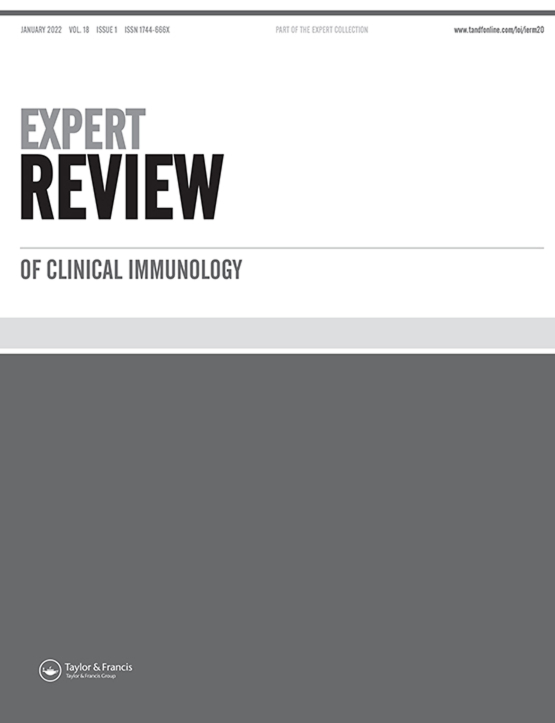Submit your research today!
Expert Review of Clinical Immunology- Cancer immunotherapy and the tumor microenvironment
Opportunities for biomarker discovery, stratification and treatment optimization
About the special issue
Recent advances have revealed the tumor microenvironment (TME) as a critical player in cancer genesis, progression and therapeutic resistance. The tumor microenvironment supports tumor survival through intricate interactions, extracellular matrix, vasculature, and specialised cell types including immune cells.
Exploiting mechanisms and targeting the immune or metabolic microenvironment offer clinical opportunities for immuno-oncology, including T-cell and B-cell therapies, cancer vaccines and combination therapy. Further, the tumor microenvironment can reveal biomarkers for patient stratification and accurate prognosis. Understanding of the tumor microenvironment holds huge potential for improving diagnosis and treatment for cancer patients.
Expert Review of Clinical Immunology is pleased to invite submissions to a special focus issue on cancer immunotherapy and the tumor microenvironment, with a specific focus on clinical insights, therapeutic development and trial design.
Editorial Board Members Professor Sophia Karagiannis (Kings College London) and Professor Nima Rezaei (Tehran University of Medical Sciences) are advising on this exciting collection of cutting-edge insights into the tumor microenvironment.
Potential submissions could include:
-Characterisation and role of immune cell types e.g., neutrophils, fibroblasts, Natural Killer
cells
– Relevance of the tumor microenvironment in cancer evolution
– Interactions with microbiome
– The influence of metabolic processes
– Interactions with the extracellular matrix
– Role of the tumor microenvironment in cancer progression
– Inflammation gene signatures
– Tumor-immune cell interactions
– Biomarkers and predicting treatment outcomes
– Patient stratification in immuno-oncology
– New targets for cancer immunotherapy
– Drug resistance
– Computer modeling and new technologies in target identification
– Impact and modulation of the tumor microenvironment in immune checkpoint inhibitor
therapy
– Outlook on progress in the clinic and patient outcomes
We welcome submissions of Original Research, Reviews, Perspectives, Meeting Reports and Editorials for consideration in this special focus issue.
If you are interested in contributing or would like to learn more, then please reach out to the Commissioning Editor, Amelia Dennis, who will be happy to assist.
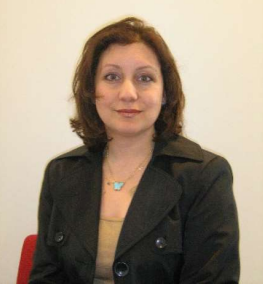
Professor of Translational Cancer
Immunology and Immunotherapy
St. John’s Institute of Dermatology
King’s College London
United Kingdom
About the Guest Advisors:
Sophia Karagiannis is a translational B cell and cancer immunologist. She gained BA and MS degrees in Biochemistry at Rutgers University, USA, having received scholarship awards and a teaching assistantship and completed a PhD in B cell and IgE immunology at King’s College London, UK, under SERC and SmithKline Beecham-funded studentships.
She developed immunotherapeutic strategies for cancer and inflammatory diseases in academic and biotechnology environments in London and Cambridge as a postdoctoral associate and scientific investigator and formed research group as a National Institute for Health Research Biomedical Research Centre Senior Research Fellow in 2007.
She was appointed Professor of Translational Cancer Immunology and Immunotherapy at King’s College London in 2019 and heads a cancer
antibody discovery team focusing on the crosstalk between human immunity and solid tumours with a particular focus on B cell and antibody responses and understanding the impact of antibody isotype on antibody therapeutic efficacy for melanoma, ovarian, and breast cancers.
Research areas in the Karagiannis laboratory also include antibody-engaging immune effector cells such as monocytes/macrophages and basophils in the circulation and the tumour microenvironment, and engineering antibodies of different specificity, class/isotype, Fc-optimised antibodies and antibody-drug conjugates (ADCs).
She is a founding member of the field of AllergoOncology, focused on the interface between Th2 immunity, allergy, IgE, and cancer, and serves as Secretary of the AllergoOncology Working Group in the European Academy of Allergy and Clinical Immunology. Her group is the first to design and translate IgE class antibodies to a first-in-man clinical trial in cancer patients. She is the author of several patents on antibody technologies, and the scientific founder of Epsilogen Ltd, the first immuno-oncology company dedicated to developing IgE-based cancer immunotherapies.
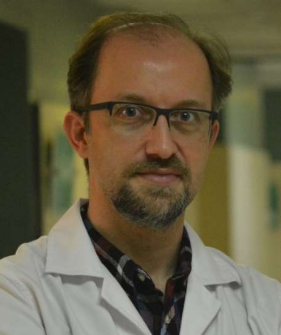
Network of Immunity in Infection,
Malignancy and Autoimmunity
(NIIMA), Universal Scientific Education
and Research Network (USERN),
Tehran, Iran
Research Center for
Immunodeficiencies, Children’s
Medical Center, Tehran University of
Medical Sciences,
Department of Immunology, School of
Medicine, Tehran University of Medical
Sciences, Tehran, Iran
Professor Nima Rezaei gained his medical degree (MD) from Tehran University of Medical Sciences
and subsequently obtained an MSc in Molecular and Genetic Medicine and a PhD in Clinical Immunology and Human Genetics from the University of Sheffield, UK. He also spent a short-term fellowship of Pediatric Clinical Immunology and Bone Marrow Transplantation in the Newcastle General Hospital. Professor Rezaei is now the Full Professor of Immunology and Vice Dean of Research and Technologies, School of Medicine, Tehran University of Medical Sciences, and the co-founder and Head of the Research Center for Immunodeficiencies. He is also the Founding President of Universal Scientific Education and Research Network (USERN). Prof. Rezaei has already been the Director of more than 100 research projects and has designed and participated in several international collaborative projects. Prof. Rezaei is the editor, editorial assistant, or editorial board member of more than 40 international journals. He has edited more than 50 international books, has presented more than 500 lectures/posters in congresses/meetings, and has published more than 1,100 scientific papers in international journals.
Submission information
Submission Deadlines:
Standard track deadline: 1st December 2023
Rapid track deadline: 1st January 2024
Fast track deadline: 1st February 2024
Accelerated Publication
Publish in 3 – 5 weeks from submission
Submission to acceptance: 2 – 3 weeks
1 – 2 weeks for peer review
1 week for author revision
Acceptance to online publication: 1 – 2 weeks, with proofs within 5 working days and 48 hours for author review
Cost per article: $7000 / €6200 / £5500
Publish in 7 – 9 weeks from submission
Submission to acceptance: 5 – 6 weeks
3 – 4 weeks for peer review
2 weeks for author revision
Acceptance to online publication: 2 – 3 weeks, with proofs within 10 working days
Cost per article: $3900 / €3400 / £3000
By publishing in Expert Review of Clinical Immunology will:
Gain recognition from an international audience and increase your opportunities for future collaboration
Receive 50 free e-prints & promotional tips on promoting your article courtesy of our Author Services site
Immediately see the impact of your research made in the community by tracking downloads, citations, and the Altmetric Score of your article on My Authored Works
Increase the discoverability of your research with MEDLINE listings and more
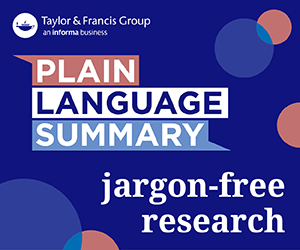
When you are ready to submit your article, communicate the significance of your original research in a clear language to a broad audience using Plain Language Summary.
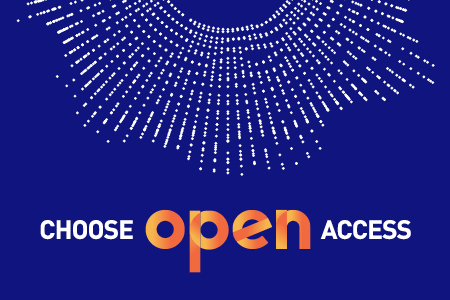
Open access makes published academic research freely and permanently available so anyone, anywhere can read and build upon this research. We champion researcher choice with a variety of open access publishing options to meet the unique needs of each author.

Considering publishing multimedia content? Research shows an increase in engagement and visibility when your research is accompanied by multimedia. Get in touch with Senior Editor Priti Nagda to discuss any specific requests.
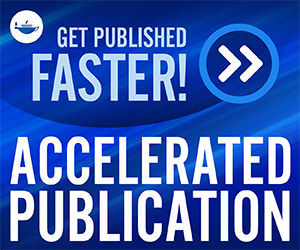
Want to keep competitive advantage by getting your discoveries to market quickly? Or is time critical in your publishing strategy? Discover our Accelerated Publication options to help get your research into a high-quality, peer-reviewed journal, fast.
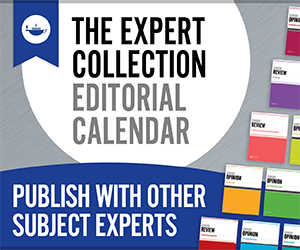
Explore the 2023 Expert Collection Calendar of special themed issues. Each special themed issue will be a one-stop resource for those interested in the field. By publishing your article, you can reap the benefits of the collection’s visibility and high impact.
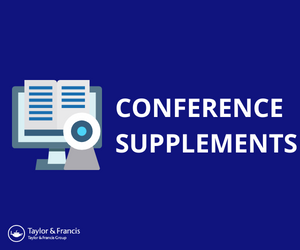
Conference material supplements can include the following article types: Poster extracts, Conference abstracts, and Presentation extracts. Open access conference material supplements are peer-reviewed, permanent, and citable.

Pre-submission manuscript preparation can help you maximize the impact of your research and improve the quality of your manuscript. Services include English Language Editing, Scientific Editing, Manuscript formatting, and many more!
